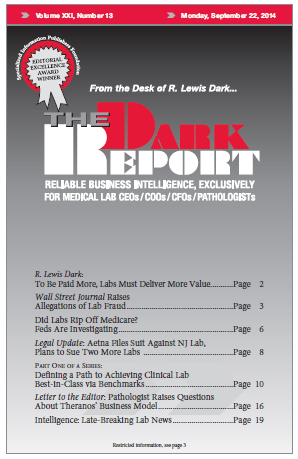FINALLY, A MAJOR HEALTH INSURER IS taking a hard line against clinical laboratories it suspects of committing fraud. Aetna Health, Inc., and Aetna Life Insurance Company, of Hartford, Connecticut, have sued one lab company and included physicians as defendants in that case. Aetna officials indicate that other lawsuits against labs can be expected. At a …
Aetna Files Suit against NJ Lab, Plans to Sue Two More Labs Read More »
To access this post, you must purchase The Dark Report.


